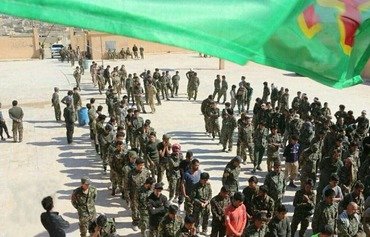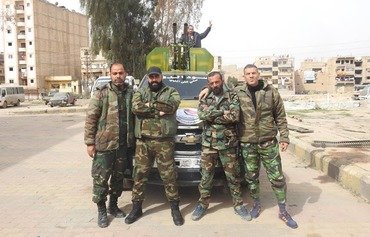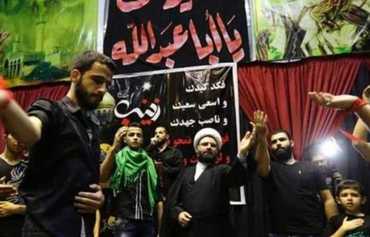Members of the pro-regime National Defence Forces (NDF) militia in the Syrian city of Deir Ezzor are turning increasingly violent and engaging in illegal activities to offset their financial losses, activists told Diyaruna.
The regime is in dire financial straits, causing a pause in the disbursement of salaries to the militia's elements. This has led to increasing violations against local residents and unrest in the fighters' ranks.
Deir Ezzor activist Jamil al-Abed told Diyaruna that lawlessness prevails among NDF elements in the city of Deir Ezzor after salaries went unpaid for the third consecutive month.
He attributed the stoppage in payments to the "severe financial hardships experienced by the Syrian regime due to sanctions and the long-running war".
Militias aligned with the Islamic Revolutionary Guard Corps (IRGC) and Russia are also suffering a cash shortfall, he said, noting that public disputes among rank-and-file elements and their officers have become a daily occurrence.
Many elements are refusing to carry out orders or perform the tasks assigned to them, al-Abed said, noting that some have dropped out of the militia until the payment of salaries resumes.
Furthermore, dozens of NDF elements who work in various governmental and military sectors in the city of Deir Ezzor have been discharged.
NDF militias operate under the Syrian regime, the IRGC and Russian forces, with those stationed in the city of Albu Kamal receiving orders from the IRGC, while other militias in the city of Deir Ezzor are affiliated with Russia and regime forces, al-Abed said.
The militias' officers are engaging in illegal activities to make money, he said, including the recent trend of smuggling youth out of regime-controlled areas in exchange for money and the sale of militia ID cards for exorbitant sums that can reach one million Syrian pounds ($2,150).
The ID cards are valuable because their holders are exempt from performing mandatory military service in the regime's army amid ongoing crackdowns to arrest those eligible for military service in Deir Ezzor province, he explained.
Several Syrian officials pilfered funds that were allocated for the payment of salaries, al-Abed said. Three were arrested, while a fourth managed to escape, allegedly running off with 15 million Syrian pounds ($29,000).
'Bands of mercenaries'
Saleh al-Afisi, a Free Syrian Army (FSA) officer in rural Aleppo, told Diyaruna the NDF was established by the Syrian regime to make up for the loss of its fighters in the war and as a result of defections at the start of the uprising.
But over time, members of the militia turned into "bands of mercenaries who switch allegiance between Iran, Syria and Russia" based on who pays more and who has more influence in the areas where they have a presence, he said.
NDF commander Firas Jaham, also known as Firas al-Iraqi, maintains close ties with the IRGC, but receives his orders from the Russian forces and is supposedly funded by the Syrian regime, al-Afisi said.
Jaham was recently accused of selling large shipments of ammunition and weapons but was reinstated to his position after a period of detention.
Deir Ezzor activist Ammar Saleh told Diyaruna the pause in payments for NDF militiamen has led to an increase in theft and the imposition of tributes.
In the Deir Ezzor region, where they are most heavily deployed, tributes are being imposed at security checkpoints and on store owners, he said, adding that dozens of robberies have taken place in areas where the NDF is responsible for security.
Looted items are sold in a systematic manner at designated markets, with most of the money going to militia officers and their associates.
Saleh said the situation has "deteriorated to the point where some NDF officials are looting weapons depots and selling their content to make up for the loss of salaries".
Others are also engaged in large-scale drug and narcotic trade operations, he said.

![NDF commander Firas Jaham was recently accused of selling large shipments of ammunition and weapons, but was reinstated to his position after a period of detention. [Photo courtesy of Euphrates Post]](/cnmi_di/images/2020/12/10/27369-Syria-Deir-Ezzor-600_384.jpg)






